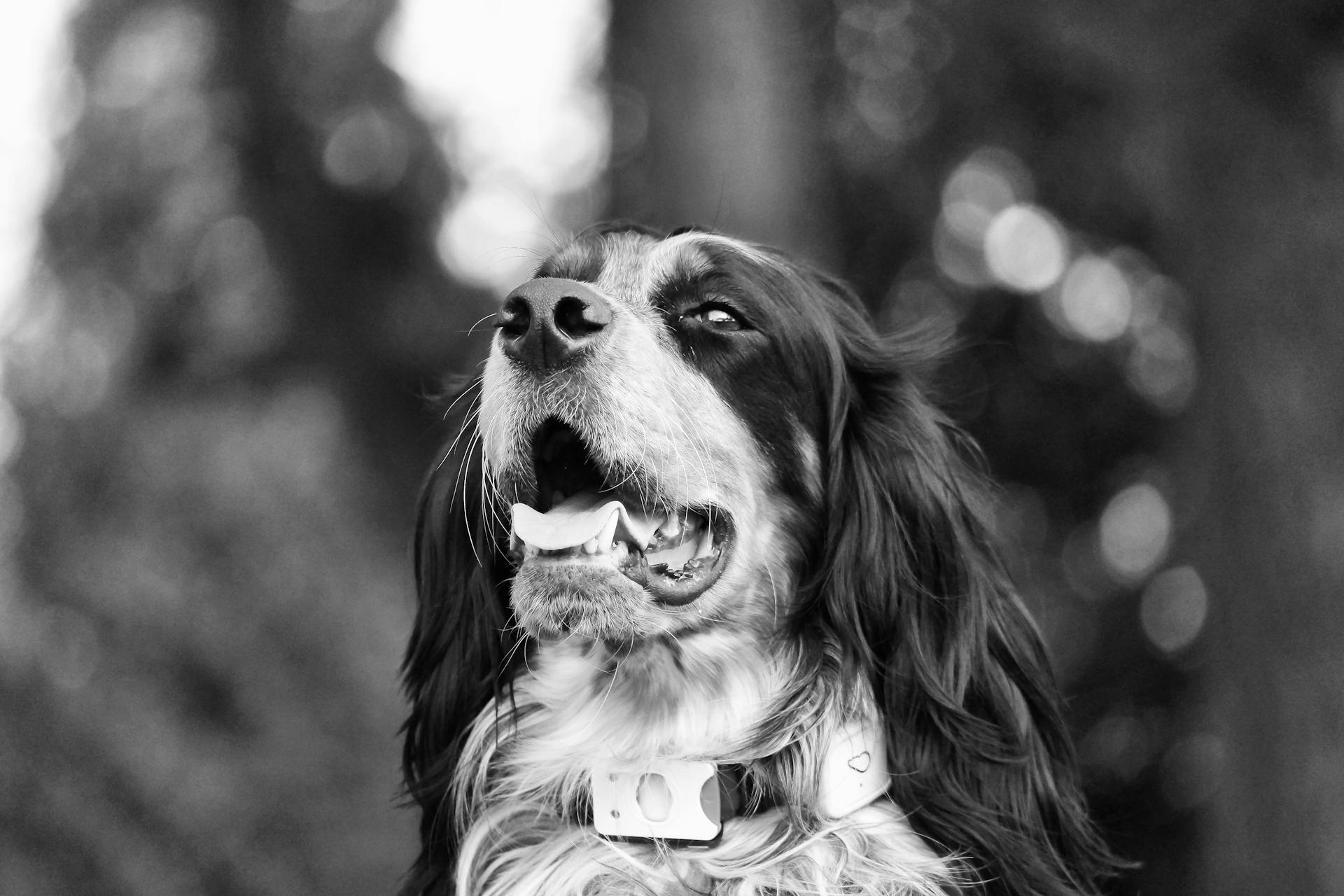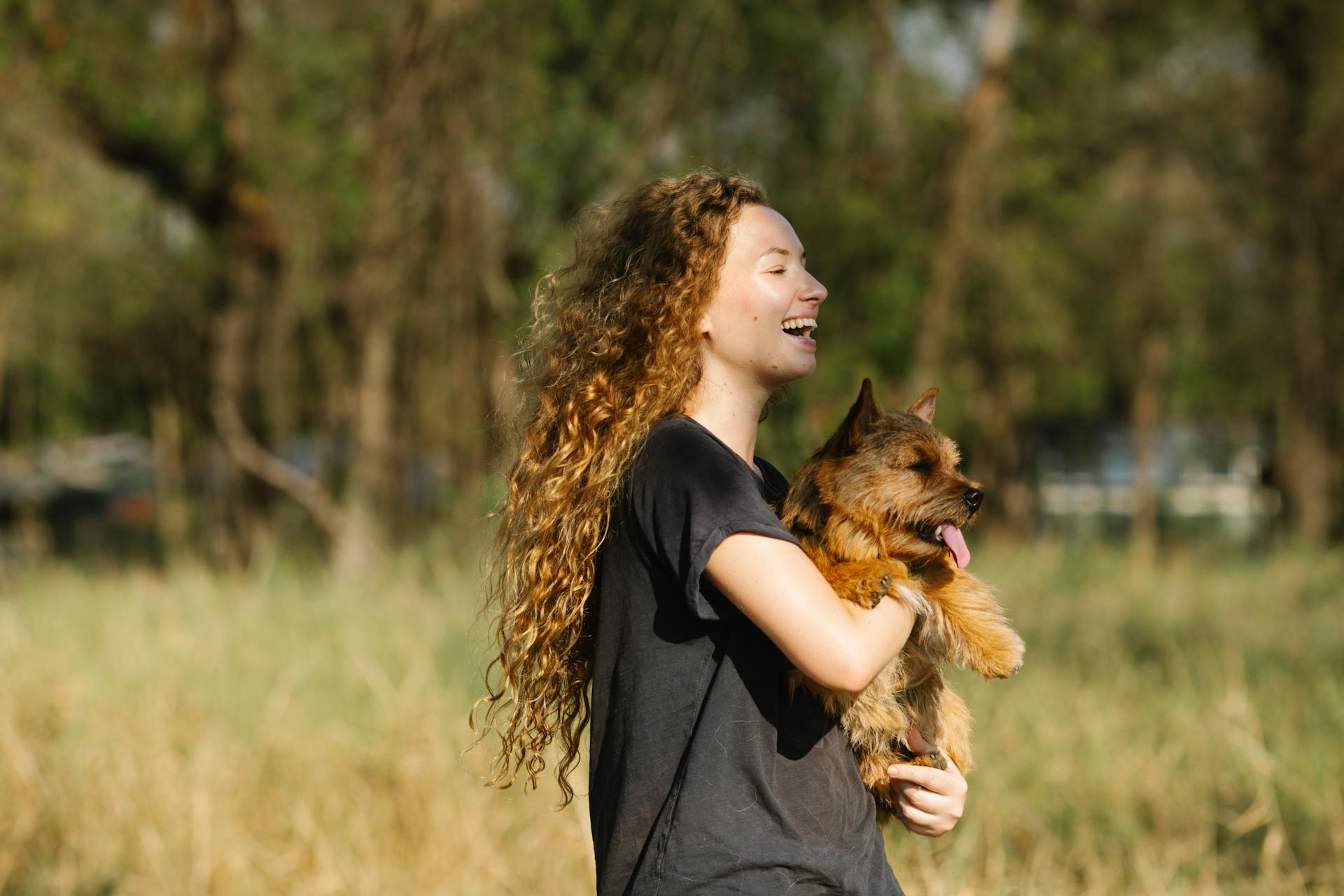
Puppy food is not inherently bad for adult dogs, but it's not always the best choice either. Some adult dogs can safely eat puppy food, but it depends on their individual needs and circumstances.
Puppy food is formulated to meet the high energy and nutrient requirements of growing puppies. It's often higher in protein and calories than adult dog food, which can be beneficial for puppies that are still growing and developing.
However, adult dogs have different nutritional needs than puppies. They may not be able to process the high levels of protein and calories found in puppy food, which can lead to weight gain and other health problems.
In fact, some adult dogs may even experience digestive issues if they eat puppy food, as it can be too rich for their systems.
Expand your knowledge: Calories in Dog Treats
Why Puppies Need Different Care
Puppies need different care because they are in a growing phase of their life. This means they require food with higher levels of amino acids, minerals, and vitamins to support their growth.
Their bodies are constantly working to maintain their body heat, which requires a lot of energy. Puppies lose body heat quicker than adult dogs, so they need to move around a lot to stay warm.
Puppy food tends to have a higher percentage of protein than adult dog food to meet their high energy needs. This is because puppies use up a lot of energy to support strong bones, ligaments, and organs during their growth.
Puppy food is also smaller in kibble size, making it easier for small mouths and teeth to chew. Adult dog food typically contains higher levels of calcium and phosphorus, which can be problematic for growing puppies.
Puppies need a diet that fuels their high energy levels, so foods should be high in calories and contain a certain amount of fats. This helps boost their body temperature and gives them the energy they need for playtime.
Check this out: Dog Food for High Energy Dogs
Dangers of Feeding Puppy Food to Adult Dogs
Feeding puppy food to adult dogs can have serious consequences, including nutritional imbalance, weight gain, and digestive upset.
Puppy food is formulated to meet the unique needs of growing puppies, with higher levels of amino acids, minerals, and vitamins than adult dog food. This can lead to an imbalance in an adult dog's diet if they're fed puppy food for an extended period.
The higher calorie and fat content in puppy food can cause weight gain in adult dogs, particularly those with lower activity levels or prone to obesity. This can contribute to various health issues, including joint problems and heart disease.
Feeding adult dogs puppy food can also lead to digestive upset, such as diarrhea or vomiting. This is because their digestive systems are not designed to handle the higher levels of fat and protein found in puppy food.
In fact, the ASPCA recommends feeding adult dogs a balanced diet that meets their specific needs, rather than relying on puppy food as a treat. If you're concerned about your adult dog's diet, it's always best to consult with a veterinarian for personalized advice.
Here are some potential risks associated with feeding puppy food to adult dogs:
- Nutritional imbalance: Puppy food may contain excessive levels of certain nutrients, such as protein and fat, that can lead to an imbalance in an adult dog's diet.
- Weight gain: The higher calorie content in puppy food can cause weight gain in adult dogs, particularly those with lower activity levels or prone to obesity.
- Digestive upset: Adult dogs may experience digestive upset, such as diarrhea or vomiting, when fed puppy food due to its high fat and protein content.
Feeding Adult Dogs
Adult dogs have different nutritional needs than puppies, and feeding them puppy food can lead to health problems.
Puppy food is formulated to support rapid growth and development, which is not necessary for adult dogs.
A typical adult dog requires a balanced diet that meets their energy needs, which is around 1,000-1,500 calories per day.
This can vary depending on factors such as age, breed, and activity level.
Feeding adult dogs puppy food can cause weight gain and obesity, as it is often higher in calories and fat.
This can increase the risk of chronic health problems, such as diabetes and arthritis.
A well-balanced adult dog food should contain a mix of protein sources, such as chicken or beef, and complex carbohydrates, like brown rice or sweet potatoes.
This will provide the necessary nutrients for overall health and well-being.
Discover more: Health Problems in Labrador Retrievers
Nutritional Concerns
Puppy food has a higher protein content than adult dog food, with a minimum of 22 percent protein, compared to 18 percent in adult food. This extra protein can be beneficial for growing puppies, but not for adult dogs with existing medical conditions.
Eating puppy food can worsen conditions like kidney disease in adult dogs, as the extra protein and minerals can tax their kidneys and lead to vomiting, diarrhea, or even kidney failure.
High-fat puppy food can also be problematic for adult dogs, containing at least 3 percent more fat than adult dog foods. This excess fat can trigger pancreatitis, causing vomiting and diarrhea due to inflammation and swelling of the pancreas.
Check this out: Is High Protein Dog Food Good for Dogs
Worsening Medical Conditions
If your adult dog has an existing medical condition, you need to be careful about what you feed them. Adult foods are formulated to meet the nutritional needs of mature dogs, but puppy foods are designed for rapid growth and development.
Worth a look: Bichon Frise Foods to Avoid

Puppy foods contain a minimum of 22 percent protein, which is 4 percent higher than adult foods. This can be a problem for dogs with conditions like kidney disease.
The extra protein and minerals in puppy food can tax your dog's kidneys, leading to vomiting, diarrhea, or even kidney failure.
For your interest: Foods for Dogs with Diabetes
Fat Content
Puppy food is rich in fats, making it perfect for young pups, but not suitable for adult dogs.
Feeding your adult dog puppy food can make them sick, so it's essential to switch to an adult formulation.
Puppy food contains at least 3 percent more fat than adult dog food, according to the U.S. Food and Drug Administration.
High-fat foods like puppy food can cause pancreatitis in adult dogs, leading to vomiting and diarrhea.
A fatty meal like puppy food can trigger this condition, which causes inflammation and swelling of the pancreas, as stated by WebMD.
Exploring the Debate
Some argue that adult dogs can benefit from the nutrient-dense formula of puppy food, which is higher in protein, fat, and essential nutrients. This could be especially true for adult dogs with high energy levels or those engaged in strenuous activities.
However, others point out that puppy food is specifically formulated for growing puppies, and feeding adult dogs this type of food can lead to an imbalance in their diet. Adult dogs have different nutritional needs than puppies, and puppy food may contain excessive levels of certain nutrients.
The higher calorie content in puppy food can also lead to weight gain in adult dogs, particularly those with lower activity levels or prone to obesity. Excess weight can contribute to various health issues, including joint problems and heart disease.
Feeding adult dogs puppy food may encourage them to eat more enthusiastically, especially if they are picky eaters. However, this can also lead to digestive upset, such as diarrhea or vomiting, as their digestive systems are not designed to handle the higher levels of fat and protein.
Here's a summary of the key points:
Frequently Asked Questions
Is there really a difference between puppy food and adult dog food?
Yes, puppy food and adult dog food have distinct nutritional profiles, with puppy food containing higher levels of protein, fat, and essential nutrients like DHA to support growth and development. This difference in formulation is crucial for your dog's health and well-being at different life stages.
What age should dogs stop eating puppy food?
For small breeds (under 25 pounds), stop puppy food by 9-12 months. For larger breeds, transition to adult food between 10-16 months, depending on size.
Sources
- https://www.dogster.com/dog-nutrition/can-a-puppy-eat-adult-dog-food
- https://www.becopets.com/blogs/news/can-puppies-eat-adult-dog-food
- https://www.dogster.com/lifestyle/can-adult-dogs-eat-puppy-food
- https://innovexpanse.com/can-adult-dogs-eat-puppy-food-understanding-the-debate/
- https://dogcare.dailypuppy.com/can-feeding-adult-dog-puppy-food-cause-diarrhea-vomiting-7376.html
Featured Images: pexels.com


